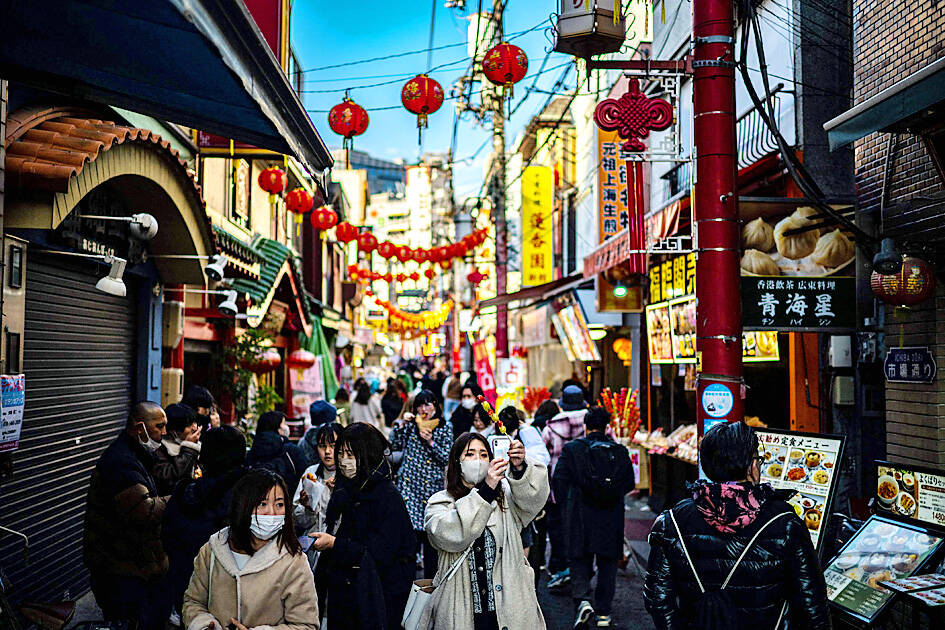Asian shares on Friday were mostly higher after Wall Street benchmarks fell on worries that the US Federal Reserve would keep raising interest rates.
Markets rose in Taiwan, Australia, China, Japan and South Korea China in muted trading.
Hot readings on the US jobs market on Thursday got traders thinking the Fed would need to keep inflicting pain on the economy to fight surging prices.

Photo: AFP
Inflation has been easing from a peak of 9.1 percent in June to 7.1 percent in November, and investors have been hoping for signs that could prompt the Fed to ease up on applying the brakes to the economy with high interest rates.
“Overall risk sentiments could lean more toward a wait-and-see in the lead-up to the US job report later, lacking a clear conviction in market direction from Wall Street over the past few days,” IG market strategist Yeap Jun Rong (葉俊榮) said in a report.
In Taipei, the TAIEX on Friday rose 72.29 points, or 0.51 percent, to close at 14,373.34. Turnover was NT$153.86 billion (US$5.01 billion). It was up 1.67 percent for the week.
Japan’s benchmark Nikkei 225 rose 0.59 percent to finish at 25,973.85, but fell 0.46 percent for the week.
Australia’s S&P/ASX 200 added 0.65 percent to 7,109.6, gaining 1.01 percent, while South Korea’s KOSPI rose 1.12 percent to 2,289.78, up 2.4 percent weekly.
Hong Kong’s Hang Seng Index erased earlier gains, falling 0.29 percent to 20,991.64, but gained 6.12 percent for the week. The Shanghai Composite Index rose 0.08 percent to 3,157.64, rising 2.21 percent for the week.
Analysts said they expect economic growth in Asia to slow this year, although China’s emergence from almost three years of strict COVID-19 lockdowns and other containment measures contributed to a sense of optimism in Asia.
There is hope that the easing of restrictions would lead to a boom in countries’ tourism industries, and Hong Kong would be a major beneficiary, with the border opening at the weekend.
Suktae Oh, an analyst at Societe Generale, said he expects the Bank of Korea to raise rates by 25 percentage points to 3.5 percent at its policy meeting this week.
“The data continue to indicate weak economic activity and peaking inflation. The concerns surrounding financial stability have persisted due to high corporate leverage and housing market weakness, which would be bearish for growth outlook,” he said.
Additional reporting by staff writer, with CNA and AFP

US SANCTIONS: The Taiwan tech giant has ended all shipments to China-based Sophgo Technologies after one of their chips was discovered in a Huawei phone Taiwan Semiconductor Manufacturing Co (TSMC, 台積電) suspended shipments to China-based chip designer Sophgo Technologies Ltd (算能科技) after a chip it made was found on a Huawei Technologies Co (華為) artificial intelligence (AI) processor, according to two people familiar with the matter. Sophgo had ordered chips from TSMC that matched the one found on Huawei’s Ascend 910B, the people said. Huawei is restricted from buying the technology to protect US national security. Reuters could not determine how the chip ended up on the Huawei product. Sophgo said in a statement on its Web site yesterday that it was in compliance with all laws

TECH TITANS: Nvidia briefly overtook Apple again on Friday after becoming the world’s largest company for a short period in June, as Microsoft fell to third place Nvidia Corp dethroned Apple Inc as the world’s most valuable company on Friday following a record-setting rally in the stock, powered by insatiable demand for its specialized artificial intelligence (AI) chips. Nvidia’s stock market value briefly touched US$3.53 trillion, slightly above Apple’s US$3.52 trillion, London Stock Exchange Group data showed. Nvidia ended the day up 0.8 percent, with a market value of US$3.47 trillion, while Apple’s shares rose 0.4 percent, valuing the iPhone maker at US$3.52 trillion. In June, Nvidia briefly became the world’s most valuable company before it was overtaken by Microsoft Corp and Apple. The tech trio’s market capitalizations have been

Shares of Starlux Airlines Co (星宇航空) surged more than 53 percent on its debut on the Taiwan stock exchange yesterday. Starlux shares closed up 53.75 percent at NT$30.75 from its initial public offering price of NT$20 after retreating in late trading from a 60 percent rise. China Airlines Ltd (CAL, 中華航空) rose 0.90 percent to close at NT$22.35, while EVA Airways Corp (長榮航空) gained 0.40 percent to close at NT$37.70. In Taiwan, a newly listed stock is allowed to go beyond the 10 percent maximum increase or decline in its first five trading sessions. At the listing ceremony, Starlux chairman Chang Kuo-wei (張國煒) said

SPEED OF LIGHT: US lawmakers urged the commerce department to examine the national security threats from China’s development of silicon photonics technology US President Joe Biden’s administration on Monday said it is finalizing rules that would limit US investments in artificial intelligence (AI) and other technology sectors in China that could threaten US national security. The rules, which were proposed in June by the US Department of the Treasury, were directed by an executive order signed by Biden in August last year covering three key sectors: semiconductors and microelectronics, quantum information technologies and certain AI systems. The rules are to take effect on Jan. 2 next year and would be overseen by the Treasury’s newly created Office of Global Transactions. The Treasury said the “narrow